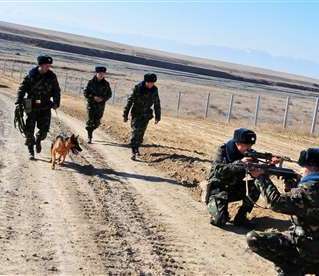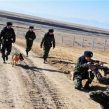
Kazakhstan’s Borders Remain Vulnerable in the Face of Potential Terrorist Threat
Publication: Eurasia Daily Monitor Volume: 9 Issue: 127
By:

The quick succession of alarming incidents at the Arkan Kergen and Tersayryk border posts (see EDM, June 27) revealed deep-running security problems and raised public concerns about the state of Kazakhstan’s border protection. Border authorities and the National Security Committee gave rather confused and often contradicting accounts of the incident to journalists, creating the impression that they were concealing real causes of the event from the public.
A few days after the killings of guards at the two above-mentioned border posts, President Nursultan Nazarbayev called the incidents an “act of terrorism” (www.interfax.kz, June 4). Rumors fueled nationalist sentiments and generated suspicion that Uyghur separatists operating in China might have attacked the border guards (Zhas Alash, June 7). During his visit to China on June 6, President Nazarbayev, after discussing with Chinese officials new oil and gas projects and development of transportation links with Chinese officials, announced to the media that that the killing of 14 border guards at the Arkan Kergen border post on the Kazakhstani-Chinese border had nothing to do with foreign intrusion (www.tengrinews, June 6). Yet, while allegations about possible incursion from Chinese territory seem to be unfounded, the inability of the authorities to provide a rational explanation for the case has created tension.
The tragic events at Arkan Kergen and Tersayryk reflect only a visible tip of the iceberg in the context of the overall deterioration of discipline in military units and the frequent media reports of deaths of servicemen in mysterious circumstances – obviously victims of bullying harassment and beatings by senior officers. None of these cases were thoroughly investigated and no culprits were ever named. Dosym Satpayev, the head of the Almaty-based consultancy firm Risk Assessment Group, believes that Nursultan Nazarbayev is being constantly misinformed by his advisors about the real state of the army and border security force (Nezavisimaya Gazeta, June 20).
The atmosphere of secrecy surrounding the border incidents triggered a sharp public reaction. At a recent media conference, the Association of Afghan War Veterans of Kazakhstan made a strong statement saying that “the current situation in the border services of the National Security Committee threatens the security and independence of the country and may lead to destabilization of the internal situation” and raises doubts about the “inviolability of the [state] border.” Kairat Yelubayev, the first deputy head of the Association of Afghan War Veterans said that his organization suggests the government should take “a number of measures that may [positively] influence the situation.” These include, above all, retesting the level of competence and training of commanders of border units and detachments, as well as educating officers responsible for training of personnel. According to Kairat Yeubayev, military officers who fail to pass the test should be dismissed from army ranks. Furthermore, overall civilian control over the work of security forces in all regions and in Astana and Almaty should be established (KTK TV Channel, June 26).
Public organizations in Kazakhstan never voiced such deep concern about the low morale and lack of discipline within the military before. The strong statement from the Association of Afghan War Veterans was preceded by chains of incidents that illustrated the vulnerability of Kazakhstan’s borders to potential intrusion. In February of this year, an unmanned aircraft flew in from Uzbekistan, undetected by Kazakhstani anti-aircraft units and border guards, and circled over the Beyneu railway station in Mangystau region (western Kazakhstan) for about 15 minutes before it safely returned to Uzbekistan. The Foreign Ministry of Kazakhstan sent a note of protest to Uzbekistan, but the authorities in Tashkent practically ignored it, asserting that the violation of air space did not take place (KTK TV Channel, February 17).
On June 28, Kazakhstani media sources, referencing Kyrgyzstan’s 24.kg news agency, reported the arrest of two residents of Kazakhstan in Bishkek. The suspects reportedly were carrying extremist literature calling on Muslims to launch a holy war of jihad against infidels. Parts of home-made bombs were also seized from them (RIA Novosti-Kazakhstan, June 28).
In his public speeches, Nursultan Nazarbayev often speaks about the “threat from the South.” In his speeches to domestic audiences, he downplays the potential danger of religious extremism and terrorism, which are likely to escalate after the pullout of NATO and American troops from Afghanistan. According to him, the only imminent threat to Kazakhstan comes from instability in Afghanistan, especially in the context of drug trafficking. Not long ago, in his interview with the Russian Rossiya 24 television channel, Nazarbayev stressed that the only real threat would come from Afghanistan, “which is continually increasing the annual output of narcotic substances” (www.tengrinews, April 25). During his talks with the UN Secretary-General’s special representative Jan Kubis, President Nazarbayev reiterated that security in Central Asia entirely hinges on the situation in Afghanistan (Kazakhstanskaya Pravda, June 28).
Kazakhstan seems to rely heavily on the Collective Security Treaty Organization (CSTO), and primarily on Russia, for its border security. But Uzbekistan’s recent statement that it would suspend its membership in the CSTO shows the fragility of this Russian-led structure. A viable alternative for Kazakhstan in these circumstances would be a radical reform of its border service. Kazakhstan’s border security forces are weakened by loose discipline, as well as corruption within the higher echelons of the military hierarchy, which undermines the public image of the army and precludes closer border cooperation with its neighbors. But given the prevailing rivalry in Central Asia, latent territorial disputes, regional ambitions, and disagreements on energy and water issues, Kazakhstan will find it difficult to enhance border cooperation with its neighbors even if it can tackle its domestic corruption issues.




